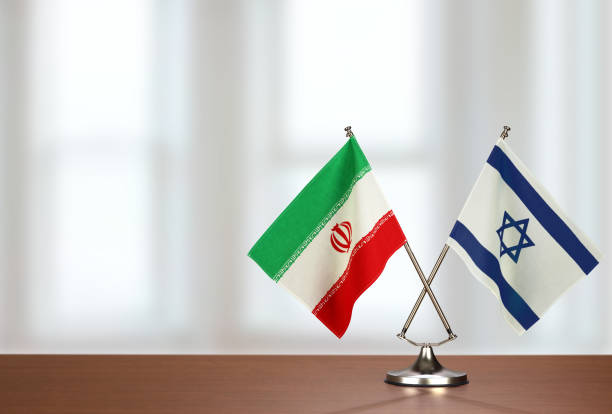Israel Poised for Potential Strike on Iran Amid Escalating Tensions, U.S. Withdraws Diplomats
Israel is preparing for a potential strike on Iran, prompting U.S. diplomatic withdrawals and heightening Middle East tensions amid stalled nuclear negotiations.
 Two crossed national flags on wooden table photo by (@ iStock)
Two crossed national flags on wooden table photo by (@ iStock)Israel appears to be preparing to launch a military strike on Iran, according to U.S. and European officials, a move that could inflame the already volatile Middle East and jeopardize the Trump administration’s ongoing efforts to broker a diplomatic deal aimed at halting Iran’s nuclear program.
Amid growing concern over a possible Israeli attack and anticipated Iranian retaliation, the United States on Wednesday began withdrawing diplomats from Iraq and authorized the voluntary departure of military family members stationed in the Middle East. The scope of Israel's potential operation remains unclear.
Tensions have escalated following months of pressure from Israeli Prime Minister Benjamin Netanyahu, who has urged President Trump to act while Iran is perceived as vulnerable. Although Trump blocked a previous Israeli strike plan, he now appears less hopeful about diplomacy, especially after Iran’s supreme leader rejected a U.S. proposal to phase out uranium enrichment.
While it remains uncertain whether Trump has made a renewed attempt to dissuade Netanyahu, the president’s tone has shifted. In a recent interview with *The New York Post*, Trump stated he had grown “less confident” in securing a deal with Tehran. Meanwhile, American and Iranian officials still plan to meet for further negotiations in Oman on Sunday, with U.S. envoy Steve Witkoff expected to attend, despite Trump's claim that Iran’s position is “unacceptable.”
In conjunction with the U.S. personnel withdrawal, the British maritime trade agency issued a regional advisory, warning commercial vessels in the Persian Gulf, Gulf of Oman, and Strait of Hormuz to exercise heightened caution due to increased military tensions.
Iranian officials have held internal discussions and devised a response plan to a possible Israeli attack. A senior Iranian official confirmed that Tehran’s strategy includes an immediate missile counterstrike on Israel using hundreds of ballistic missiles. A similar missile barrage in October 2024 caused limited damage, partly due to U.S. defensive support for Israel.
President Trump and Netanyahu spoke by phone on Monday, but the White House released few details. Trump had convened with his national security team at Camp David on Sunday. At a public event later in the week, Trump was evasive when asked about the withdrawals, responding, “Well, you’re going to have to figure that one out yourself.”
Iranian Defense Minister Gen. Aziz Nasirzadeh warned Wednesday that the U.S. would suffer heavy losses in any conflict, threatening American military bases in the region. In parallel, Iranian officials condemned statements made by Gen. Michael E. Kurilla, head of U.S. Central Command, who told Congress he had presented strike options against Iran. His planned Senate testimony was postponed without explanation.
Iran’s U.N. mission labeled Kurilla’s comments “militarism” and accused the U.S. of fueling instability. The exchange coincided with the International Atomic Energy Agency’s board meeting in Vienna, where the U.S., U.K., France, and Germany submitted a resolution to censure Iran for expanding its nuclear program in violation of the 2015 nuclear deal.
The IAEA board is expected to vote on the resolution Thursday, which could trigger the reimposition of U.N. sanctions on Iran, originally lifted under the Obama-era agreement. Trump withdrew from that deal in 2018, a move Iran cited to justify its expanded nuclear activity. Iran’s Foreign Minister Abbas Araghchi warned that censure would provoke a “STRONG” response from Tehran.
The U.S. State Department declined to specify how many personnel would be withdrawn from Iraq. The Associated Press reported that nonessential staff would be removed from Baghdad and that similar orders were given for embassies in Bahrain and Kuwait. Navy and Marine families in Bahrain were among those authorized to depart.
Since the U.S. exit from the nuclear deal, Iran’s atomic program has progressed significantly. Analysts estimate Iran is near producing enough nuclear material for ten bombs. Although constructing a deliverable weapon could take months, Israeli officials consider Iran’s progress unacceptable and have repeatedly threatened military intervention.
With Iranian proxy groups like Hezbollah and Hamas recently weakened, and Iran’s air defenses damaged by Israeli strikes, some Israeli officials view this moment as a strategic opportunity. However, analysts caution that Iran is rebuilding its air defenses, increasing the risks of unilateral Israeli action without U.S. support.
Meanwhile, U.S. oil prices surged above \$68 per barrel Wednesday amid concerns that conflict could disrupt supplies. The U.S. aircraft carrier Carl Vinson remains stationed in the Arabian Sea with over 60 aircraft, including F-35 stealth fighters. A senior Navy official confirmed there are currently no plans to reposition the carrier. Additional American fighter jets in the region are also on standby, having played a role in defending Israel during previous Iranian attacks.







Conversation